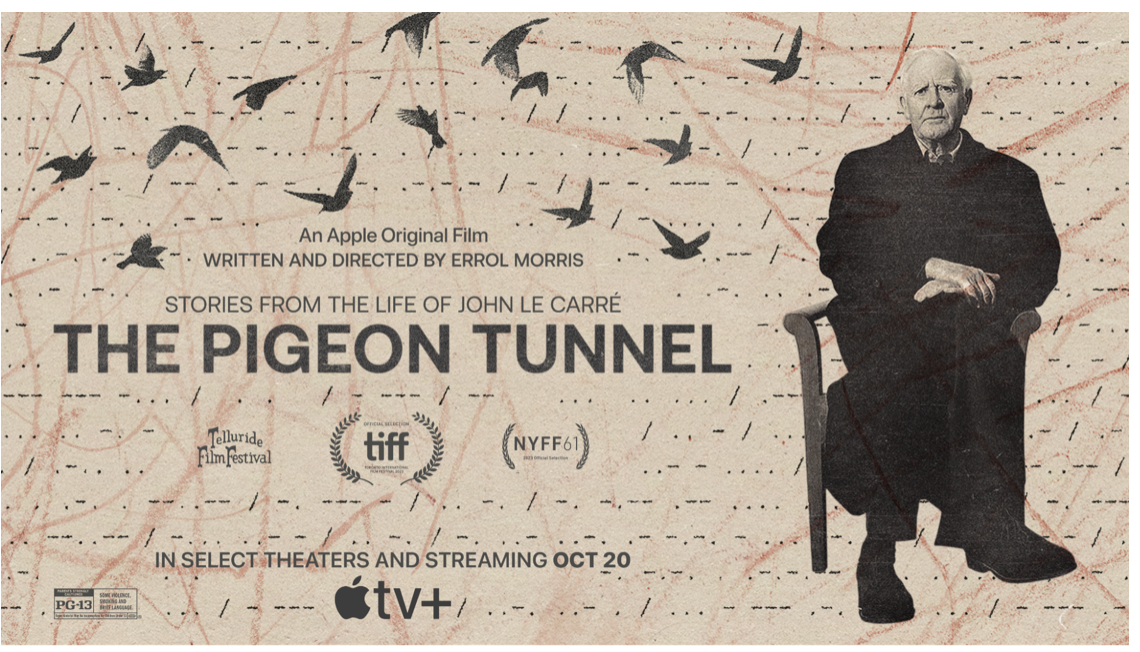Review | The Documentarian Who Came in from the Cold
Unique Documentarian Erroll Morris Us up to New Tricks with His New John le Carré Doc, 'The Pigeon Tunnel,' Now at Santa Barbara Riviera Theatre

Unique Documentarian Erroll Morris Us up to New Tricks with His New John le Carré Doc, 'The Pigeon Tunnel,' Now at Santa Barbara Riviera Theatre

In the contemporary documentary world, there are docs — from varying schools and approaches — and then there are Erroll Morris docs, a breed unto itself. More of an inspired doc reinventor, Morris wriggled into the genre decades ago with quirky gems as his pet-cemetery film Gates of Heaven (not to be confused with Heaven’s Gate) and the loveably loopy Vernon, Florida, then went onto more stylized production numbers such as the Oscar-winning and prisoner-subject-freeing Thin Blue Line and, among other things, intriguing portraits of singular and controversial political figures such as Robert McNamara, Donald Rumsfeld, and Steve Bannon.
Along comes another left-of-center delight, The Pigeon Tunnel, roughly related to his military-politico portraits but this time with a significant twist: the subject in the talking-head crosshairs is a literal “spy who came in from the cold,” spy-turned-thriller-novelist John le Carré. Like the earlier Morris docs on specific subjects, the filmmaker himself makes his presence slyly known, as the sly and cleverly manipulative off-camera inquisitor. This time around, though, Morris’s presence is more, well, present — as an unseen interviewer but questioning voice — who le Carré himself directly addresses.
In the film’s opening moments, le Carré — who once worked in Army intelligence — switches up roles with his interviewer, asking, “Who are you? Sometimes you’re a spectral figure, sometimes you’re God, and sometimes you’re present.” Le Carré continues, “this is a performance art. You need to know whether you’re performing to a trade union, an elite audience, you need to know something about the ambitions, about the person you’re talking to.”
The cat-and-mouse game between savvy thinkers interacting pulls us into another new intriguing twist in the 75-year-old Morris’s long filmography. In what turned out to be the last substantive interview for the author, who passed away in 2020 at age 89, Morris’s lavish documentary portrait digs deep, with the subject’s wittily conveyed permission and candor, into a rich writerly life full of contradictions and twists — like his storytelling.
Born David Cornwell, the author grew up in a house-of-cards family reality, the son of a chronic and sometimes incarcerated con man — a subject of probing, recurring interest in the film — and a mother who fled the family and remained mostly estranged from her son. Moral vagaries led the author into a spy’s life, which spun out into a literary career beginning with his semi-autobiographical The Spy Who Came in from the Cold. Numerous best-sellers and, for the normally marginalized thriller genre, unusually bold critical acclaim followed.
Not everything comes together smoothly in Morris’s latest, which feels a bit too crafty and slick for its own good at times. Philip Glass, whose score for Thin Blue Line was one of his finest achievements, supplies a nattering, almost wall-to-wall score that is more distracting than illuminating. Morris’s eager leap into the prospects of nostalgic kitsch and film clips from le Carré adaptations can make for a jarring counterpoint to the central goal of creating a compelling portrait of the actual figure/artist in the center ring.
Nonetheless, Morris knows how to inject narrative and filmic inventiveness into a project to liven up the cinematic experience. We’re not in Vernon, Florida, anymore, but the cliff hangers keep us tuned in and guessing what’s next.
The Pigeon Tunnel is currently on view at the Riviera Theatre. See sbiffriviera.com for showtimes.
Please note this login is to submit events or press releases. Use this page here to login for your Independent subscription
Not a member? Sign up here.